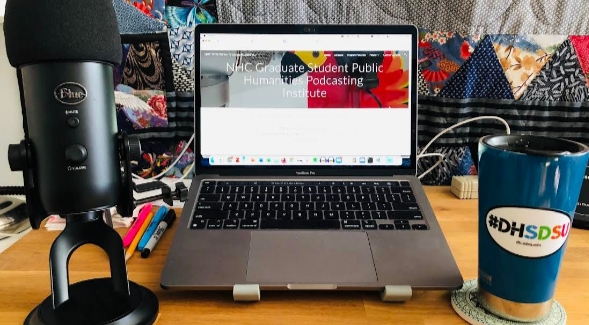Transforming the Humanities for the Digital Age
SDSUs Podcasting Institute has helped hundreds of graduate students and faculty learn more about sharing news, stories and conversation via digital audio files.

There’s a podcast for everyone: a "near-future broadcast" from a world brimming with the ravages of climate change, a celebration of the "guiltless pleasures" associated with video bingeing, warm memories of the dishes we associate with home.
And those are just three examples, drawn from the topics explored by humanities graduate students who honed their podcasting skills in a pioneering partnership between San Diego State University librarians and a national organization of scholars in the humanities.
The Podcasting Institute, part of the Digital Humanities Center that was launched at SDSU in 2015, is in its third year of offering immersive, weeklong training of students in the newest model of digital storytelling.
Conceived in a pre-pandemic era to provide its instruction through conventional workshops, the institute’s rapid shift to the virtual domain expanded its reach across the world.
Co-director Pam Lach, digital humanities librarian, created the Podcasting Institute in partnership with the National Humanities Center, a nonprofit organization that supports humanities scholarship and teaching. The institute expanded an idea of co-founder Joanna Brooks, associate vice president for Faculty Advancement and Student Success.
Co-director Jessica Pressman, a professor of English and Comparative Literature, said the podcasting venture exemplifies SDSU’s recognition of the importance of digital humanities. “It isn’t just about data, algorithms, or specific technologies,” Pressman said. “It uses a digital tool for storytelling. It translates complex ideas into stories that people care about.”
The workshop trains participants to develop collaborative, public-facing, research-based humanities content using digital media. The week includes technical sessions on using Audacity software, a Yeti microphone, and tips for planning, recording, and editing podcasts.
Additional sessions with prominent podcasters provide inspiration. Participants work in cohorts to produce a podcast by the end of the week, celebrated with a listening party.
The first session was hosted in person at SDSU, but subsequent sessions have been virtual. Each new offering has expanded the number of participants and there are now nearly 300 program alumni.
Participants proclaim the experience as truly transformative.
Rebecca Marcolina, a graduate student at University of Oklahoma said, “The institute not only introduced me to a cohort of brilliant scholars and to the wonderful world of podcasting but rejuvenated my interest and drive in my own research.”
The transition to the virtual model allowed participants to attend from around the world – including Ireland, Italy, South Africa, Cambodia and India. Scott Walter, SDSU Library dean, called the pivot to online one of many examples of innovation in library service and online learning embraced across the university during the pandemic.
“Working in collaboration with faculty colleagues and students, Lach and Pressman have provided a master class in the ways in which library spaces and services can help to spur innovation in teaching and learning,” Walter said.
From the very first session, graduate students expressed a wish that their professors could share in this experience. So the June 2021 session was designed for humanities faculty, with 55 participants from around the country. A second faculty-focused session was held specifically for faculty members from the University of California.
Yuri Ramirez, a history professor at the University of Illinois at Urbana-Champaign, was “blown away” at what could be accomplished in a one-week session. “A week can transform your life, the way you think, the way you teach students and approach scholarship.”
And Gina Brandalino, an English lecturer from the University of Michigan who participated in the summer 2021 faculty institute, said, “Learning to podcast has made me think differently about every bit of scholarship I produce. It has made me think about how to expand the audience for my work.”
Monica Casper, dean of SDSU’s College of Arts and Letters, describes the Institute as “groundbreaking and innovative,” and Lach and Pressman are excited by its ongoing success.
“Humanities are vital in the digital age as a way to combat misinformation. I am thrilled that the DH Initiative is leading the way and sharing our model,” Pressman said.
Lach is guest lecturing in classes around the country to start more students on the road to podcasting. She is also planning more Podcasting Institutes, working to scale up the program and make it sustainable.
To hear the podcasts from recent institutes, including those mentioned at the top of this article, visit the NHC Winter 2022 Podcasting Institute website.



